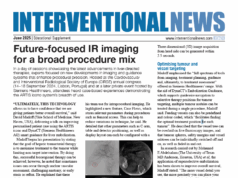
In a session titled ‘Bariatric embolization: Is it the end or a new resurgence?’ at the Global Embolization Oncology Symposium Technologies (GEST) annual conference (16–19 May, New York, USA), Clifford Weiss (Johns Hopkins University, Baltimore, USA) made a case for “his future” and the future of bariatric embolization, providing the capability to “do surgery without doing surgery” to treat a highly comorbid patient population suffering with obesity.
First, placing emphasis on the severity of the obesity crisis in the USA, Weiss relayed that a dataset collected by Nima Hafezi-Nejad (Johns Hopkins University, Baltimore, USA) et al, found that 22 states reported an obesity prevalence of over 35%. However, he noted that the comorbid nature of obesity, which causes sleep apnoea, cancer, pancreatitis, diabetes, heart disease, and suicide and depression, is fundamentally “what kills”.
“Minority populations in particular are heavily hit by this disease. We also know that annually, there’s an aggregate of US$260 billion spent on obesity and obesity-related illnesses in the USA. This is a deadly disease causing significant excess mortality annually. We need effective treatment options and I think we can all agree with that,” Weiss stated.
He explained that treatments for obesity are most effective and show the highest mortality signal improvement when sought intentionally, “in other words, you don’t seek to lose weight because you’re sick—this is the argument for why we need patients to be healthier and thinner. It’s not to look better at the beach, but it’s to be clinically healthy”.
Treatments can range from extreme, such as surgery, which is the “least accepted but the most effective”, he stated, to lifestyle modification. His focus, however, is on the pharmacotherapy treatments which sit in the middle and include interventional radiology and gastroenterology devices.
When performing bariatric artery embolization (BAE), the targeted intra-arterial therapy delivers the embolic to the gastric fundus, defunctionalising it and causing a mechanical shift which affects ghrelin-producing cells, or hunger-stimulating hormones, Weiss described. “We down-regulate these cells, turning them off rather than cutting them out.”
Weiss went on to provide an update on the ongoing BAE of Arteries with Imaging Visible Embolics (BEATLES) trial—of which he is principal investigator. He detailed that participants with a body mass index (BMI) of ≥40kg/m2 with no other comorbid conditions underwent BAE with 300–500μm Embospheres (Merit Medical), which at six months, show a 7.6% weight loss or a 60% excess weight loss.
“What we’re doing in this trial is looking at whether this is fat loss or muscle loss, and multi-compartment [magnetic resonance imaging] MRI shows that we were losing subcutaneous fat and liver fat, while muscle volume remains steady,” he said. Their six-month results also show “soft signs” of improvement, such as cardiovascular markers, changes in hunger and quality-of-life scores, each showing statistically significant values post-BAE.
Regardless of his allegiance to BAE, Weiss stated that the current US investment in anti-obesity medications (AOMs)—such as Ozempic (Novo Nordisk)—is valuable. “I didn’t want to avoid this. We have really good drugs on the market right now that are getting an easy 15–20% weight loss, so is there relevance to [BAE] still?”
In Weiss’ belief, BAE still provides a crucial and relevant benefit to this patient population as medication persistence—which is a prevailing issue with AOMs—can be avoided.
“When you take these medications away, the benefits go away with them, almost back to baseline. The current AOM guidelines state that these are lifetime medications, yet that’s a problem—many patients don’t qualify and adherence can be as low as 27% after the initial weight loss. So, can we have a combination strategy to mitigate recidivism and dependence on medication?”
Finalising his talk, Weiss advocated for the cost-effectiveness and efficacy of combined pharmacotherapy and embolization, for the dual benefit of patients as well as national and international healthcare systems.










